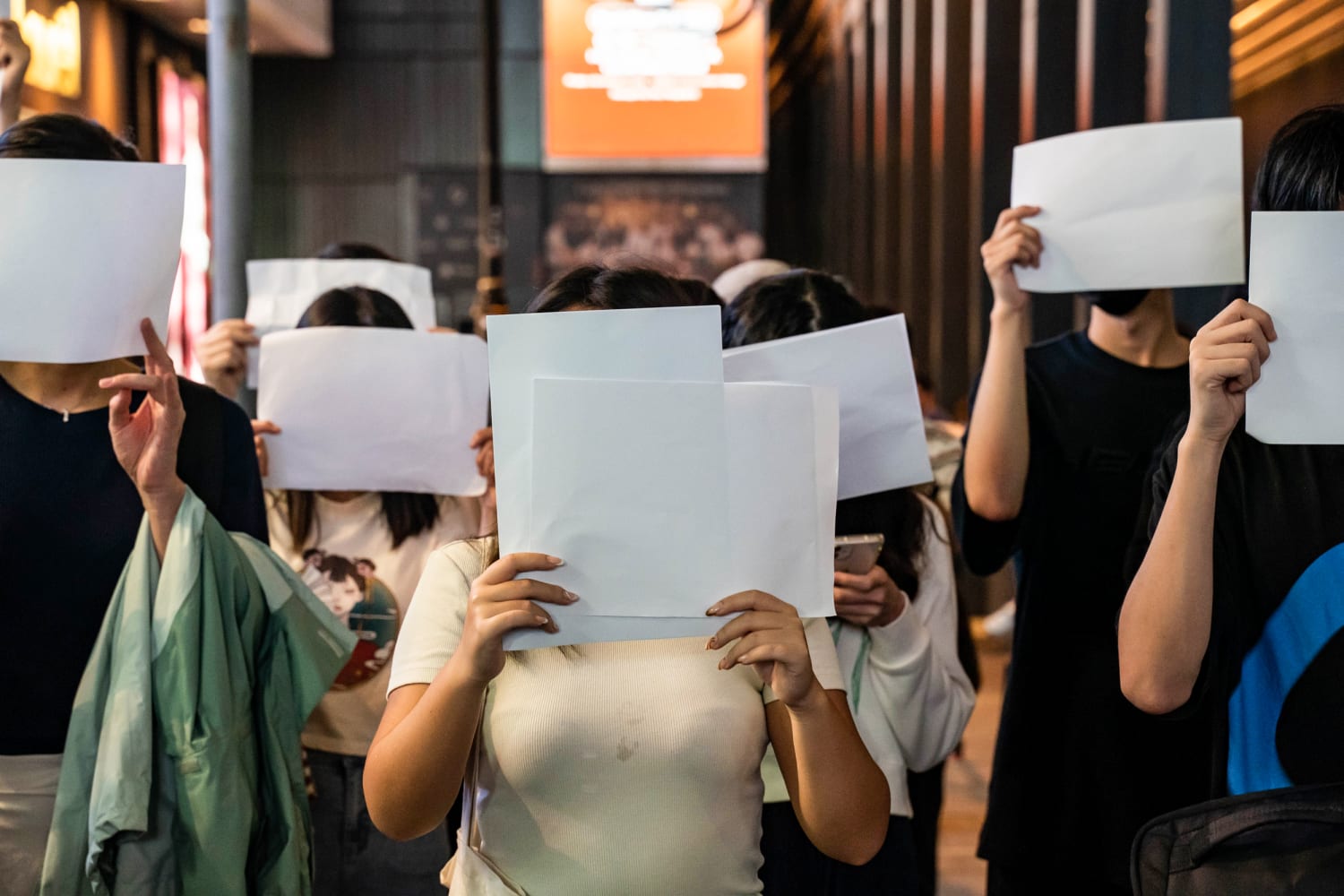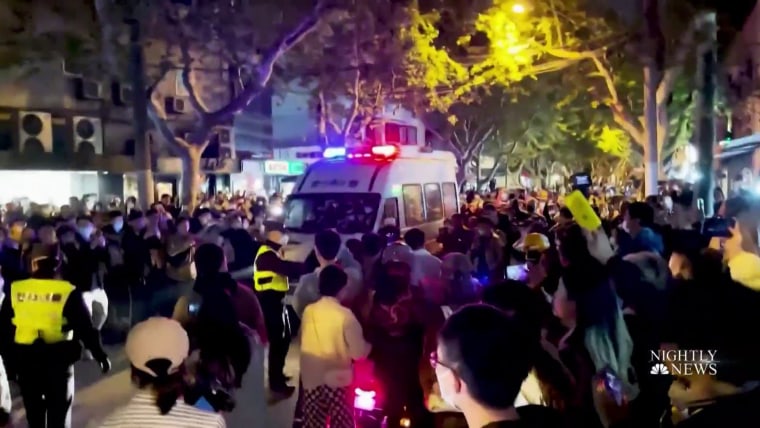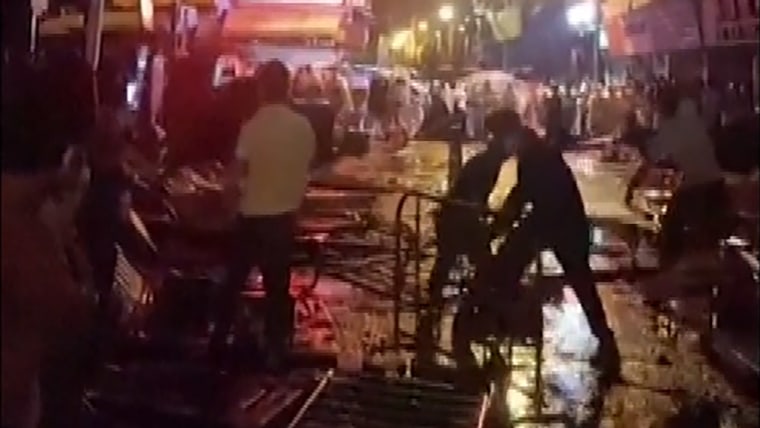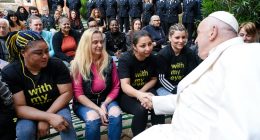As protests against China’s “zero-Covid” policy swept the country over the weekend and into this week, what the people are protesting is more than what meets the eye.
The most immediate trigger for this protest wave was the deadly Urumqi fire, which led to public outrage that lockdown measures prevented emergency responders from getting to the victims. However, a deeper cause for this unrest is that the protesters are responding to a broken social contract between the Chinese Communist Party and the people. This is a contract that guarantees people’s livelihoods — basic food, housing, and security — in exchange for their consent to be ruled.
As a Chinese politics expert, I expected prolonged lockdowns and economic slowdowns to trigger dissatisfaction and spontaneous protests. But I did not expect the wave of protests to erupt in multiple cities across mainland China, a rare occurrence. I also did not expect the protesters to be so unbridled in their calls for freedom and democracy, in addition to demanding an end to the lockdowns.
As the “zero-Covid” policy dragged on, it became clear that the Chinese government is no longer holding up its end of the bargain to guarantee basic livelihoods.
Since the crushed 1989 Tiananmen Square pro-democracy movement, Chinese people have largely learned to stay out of politics. Chinese youths have been subject to intense patriotic education that teaches them to be loyal to the ruling Communist Party and to see democracy, freedom and human rights as perilous “Western” values. Until now, the most vociferous Chinese youths have been the ultranationalist “little pinks” who cyberbully peers who criticize the Chinese government.
However, this time, young protesters both inside and outside China are the faces of an oppositional, rather than a nationalistic, form of mobilization.
How did this come about?
For one, the protests were facilitated by rapid social media dissemination despite censorship. In the lead-up to the 20th Party Congress in October, a lone dissenter in Beijing unfurled protest banners calling on people to say no to censorship, yes to freedom; no to being slaves, yes to being citizens. Despite swift censorship, a Chinese social media post referencing the incident had been viewed 180,000 times before it was deleted.
Chinese university students outside the country also amplified the lone dissenter’s slogans on bulletin boards and on social media accounts. Though largely anonymous, they broke the silence and treaded into risky social movement territory. These early movers were harbingers of the watershed moment inside China this past weekend.
But the more important question is why the protests erupted at this moment.
In part, this has to do with pent-up frustrations over the zero-Covid lockdowns that have affected their peers, friends, families, and their futures. With the economic slowdown, an estimated 1 out of 5 youths in China are unemployed. Protesters were also reacting to the injustice of multiple preventable human tragedies. It was not just the Urumqi fire. An earthquake in September triggered criticism over lockdown measures when residents were stopped from fleeing the disaster, and the draconian pandemic restrictions have routinely prevented people from accessing lifesaving medical treatment.
Chinese citizens had largely accepted the lack of political freedoms in exchange for basic guarantees of a secure and stable life, but now the latter has been severely compromised. In the early days of the pandemic, when death tolls climbed astronomically in the United States and other Western democracies, many Chinese people felt that their social contract — one that prioritizes survival over personal freedom — was superior. They could “eat bitterness” with quarantines, frequent checks of health codes, and lockdowns so long as it guaranteed their survival.
But as the “zero-Covid” policy dragged on, it became clear that the Chinese government is no longer holding up its end of the bargain to guarantee basic livelihoods. With 20% youth unemployment, businesses closing, migrant workers left homeless and preventable deaths mounting, some Chinese citizens are withdrawing their consent to be ruled.
Remarkably, the protesters in and outside China are demanding not just economic livelihood, but also political rights, including freedom of expression. Previously, Chinese dissidents and rights activists were the ones adopting such language. Chinese protesters normally avoid such rhetoric, preferring to stick to bread-and-butter economic or local issues, which are more likely to yield concessions. They understand that speaking of freedom is like playing with fire.
It is significant that this time, Chinese protesters are borrowing a tactic from Hong Kong protesters in 2020 — holding up pieces of blank paper. This tactic visually exposes the farcical nature of censorship in China. So many words have been declared out of bounds that citizens feel they can only express their dissatisfaction via a blank sheet. This blankness represents all the words that they want to express but cannot. It suggests the beginnings of a political awakening in which people realize that mere survival is not enough; they must also be able to express themselves.
Despite the watershed nature of these protests, it is premature to call it a revolution. We do not yet know the full scale of such protests, nor do we know how long they will be sustained, given that China’s strong security apparatus is already in motion. The country’s 1.4 billion people are not all in revolt. In fact, the protesters may represent a small but vociferous segment of the citizenry.
Nonetheless, these protests should not be judged based on whether they are able to change policy, though government concessions are already evident with restrictions being partially lifted in certain localities. They should be seen for what they are: expressions of dissent by certain members of a society who have endured too much and been silenced for too long.
Source: | This article originally belongs to Nbcnews.com











